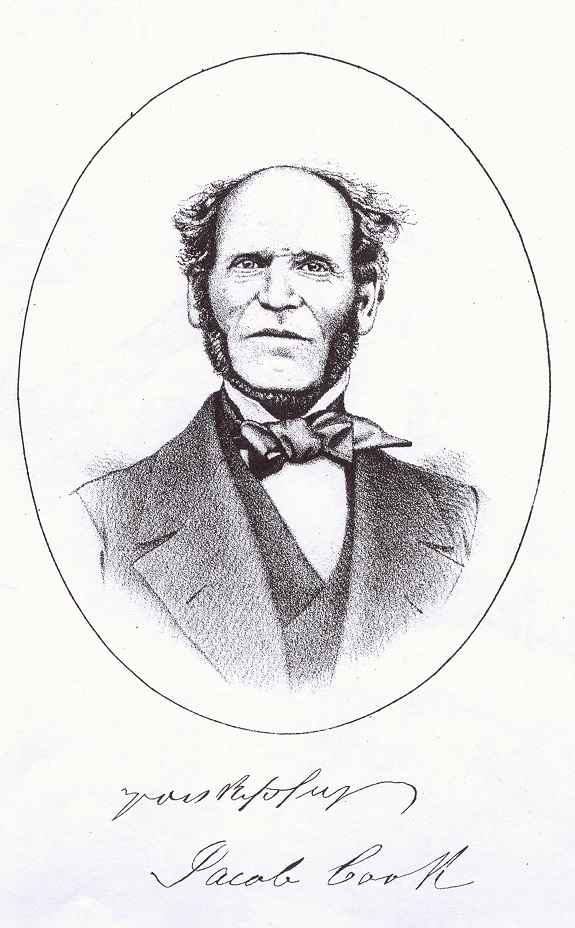
Cook Street, near the intersection of Dundas Street and Hurontario Street, takes its name from the namesake of the historic village of Cooksville, Jacob Cook (1776-1873).

Jacob Cook was born on April 26, 1776 in Pennsylvania, with his family later settling near Ancaster, Ontario. A story recounts that Jacob met another early settler in 1814 or 1815 near Palermo, and that person convinced Jacob to purchase his lot for 30 pounds. Reportedly, Jacob was given a long period of time for which to pay for the land. The deed for the property was registered in 1819. This property was at the southwest corner of what is now Hurontario Street and Dundas Street West.
Jacob was not a farmer – he had loftier ambitions. In 1820, Jacob received a government contract to carry mail between York and Ancaster. Over time, Jacob expanded his mail contracts, and added a tavern (first named the Atlantic Hotel, and later known as the Cooksville House) and stagecoach service to his enterprise. The hotel became the departure point for his stagecoach and mail service.

From Cooksville, stagecoach and mail routes went to Kingston, Hamilton, Toronto, Queenstown, Niagara, Brantford, Galt, Preston, London, Goderich and throughout Peel County. By 1831, he also operated a daily stage service from Cooksville to Brampton, Cheltenham and Georgetown.
In 1823 Jacob married Anna Ogden of Etobicoke, whom he had met while traversing his mail route. Jacob and Anna had 12 children: Jacob Jr. (1824-26), Mary, Miles Washington, Anna, William (1829-1834), Pizarius (1834-35), Hannah (1835-1870), Henrietta, Eliza Naomi (1840-41), Charles (1842-1842), Thomas (1841-1865) and Eliza Mahalia (1844-1845). The community was officially named Cooksville, after Jacob Cook, in 1836. In 1846 at village survey was laid out on the north side of Dundas Street, and two of the street names were named in the family’s honour: Novar Road was originally named Ogden Street in reference to Jacob’s wife’s family, and Cook Street, in reference to Jacob.
Jacob was an influential early settlers in the community, serving as Justice of the Peace in 1843 and as Road Commissioner in 1846 and 1847. Jacob Cook, a true captain of early industry, died on March 3, 1873, at age 77, and was buried in the Dixie Union Cemetery.
NOTE: This story was previously published as part of the Way Back Wednesday series in Modern Mississauga by Heritage Mississauga.
It can be found on their website here: https://www.modernmississauga.com/main/2019/6/12/the-history-of-mississaugas-cook-street



Comments are closed.